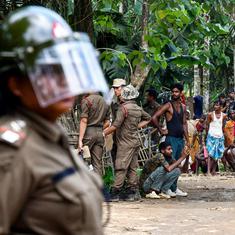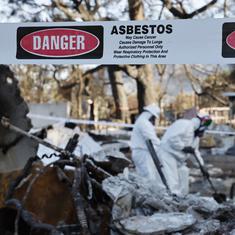Last Monday, the United States-based non-profit Wikimedia Foundation agreed to share with the Delhi High Court basic subscriber information about the users who edited the news agency ANI’s Wikipedia page. This came during the proceedings of a defamation suit filed by ANI against the user-created online encyclopeida for stating that ANI had been accused of serving as a “government propaganda tool”. The data about the suers will be shared in a sealed cover, which means it will not be available to the public.
While it is unclear what details will be shared with the High Court, basic subscriber information typically refers to a user’s name, address, email address, phone number and other identifiers.
If the High Court goes ahead with this, it would mark the first instance of Wikipedia sharing user information with an Indian official organisation. Wikipedians – the term used by the lakhs of volunteer Wikipedia writers and editors around the world to describe themselves – that Scroll spoke with said that this would lead to a chilling effect. They would be forced to censor themselves while writing or editing content related to powerful entities or politically sensitive matters.
Defamation suit
The case started in July, when ANI sued the Wikimedia Foundation in the Delhi High Court, alleging that the page about the news agency on the online encyclopedia contained defamatory content. It contended that Wikipedia was not allowing edits to remove that material. ANI demanded Rs 2 crore in damages and that the lines be removed.
Wikipedia, which is edited by volunteers across the world, is owned by the Wikimedia Foundation. It uses collaborative software to facilitate the creation and development of content.
Justice Navin Chawla who was hearing the case issued a summons, instructing Wikipedia to reveal the identities of the users who made the edits. Wikimedia’s response was delayed: it said that it is not based in India. But the court did not accept this response. In fact, Chawla warned that the authorities could block the platform in India.
Wikimedia then appealed to a two-judge bench comprising Chief Justice Manmohan and Justice Tushar Rao Gedela, arguing that defamation needed to be established before disclosing user identities. However, the judges found Wikimedia’s position “extremely disturbing” and warned that it was at risk of losing its safe harbour protection – the protection enjoyed by social media platforms under the Information Technology Act from legal action for content posted by users.
They also criticised Wikipedia for hosting another page about the case. That page, citing critics of the proceedings, referred to the court’s order requiring user data to be revealed as a form of “censorship and a threat to the flow of information”. The bench viewed this as interference in court proceedings and a breach of the sub judice principle, which restricts public commentary on ongoing cases to avoid influencing outcomes.
On October 23, the court ordered Wikipedia to take down the page within 36 hours, which it complied with on October 28.
Buckling under the court’s pressure, Wikimedia agreed to submit data of the editors of ANI’s Wikipedia page to the High Court in a sealed cover. However, it proposed redacting personal details of these Wikipedians from public court records and serving notice in the case to them, to ensure confidentiality.

Hobbling the encyclopedia
Wikimedia’s decision to share user information with the court may lead to users who edited the ANI page getting involved in the suit. This is a matter of concern for Wikipedia editors, who see this as an infringment of their freedom of speech. “Disclosure of the identities of contributors without an offence being established first will have a chilling effect on the community,” researcher, technologist and Wikipedian Rohini Lakshané explained to Scroll
Indeed, this is what is indicated by public discussions on Wikipedia noticeboards – public forums where editors of the encylopedia discuss issues related to content, policy and site maintenance. “I can’t imagine they would reveal any names,” wrote one user. “That would set a terrible precedent.”
Another user worried about what this would mean for future edits on articles. “If that happened and they disclosed the name, it would be a really big issue for Indian editors,” this person wrote. “Others might also start filing cases, such as OpIndia, for writing that it spread ‘fake news’.’”
A third user blamed Wikipedia. “Honestly I am disappointed at Wikipedia failing to protect the identity of its editors,” this user wrote. “Wikipedia forbids VPN access that can protect editors, while at the same time refusing to protect editors.”
Another user mirrored this sentiment. “This is truly disappointing,” the user wrote. “The Wikimedia Foundation is failing its editors, compromising their ‘freedom of expression.’” The user added that Wikimedia “had a responsibility to protect its editors.”
Describing the situation as “genuinely concerning”, the user wrote, “Recently, in an offline meeting, a representative from Wikimedia India was present. When I asked her about the ANI vs. Wikipedia case, she stated, ‘Wikipedia itself does not have information about editors.’ However, now the Foundation is providing editor information to the court.”
A long-time Indian language Wikipedian who spoke with Scroll on the condition of anonymity said that the sensationalist coverage of the case in the media, highlighting the statements of judges calling Wikipedia “dangerous” and threatening to ban it, has affected the morale of the people who edit the encyclopedia. “Some Wikipedians might think twice before making edits,” he said.
This move curtails the right to freedom of speech and expression guaranteed to citizens by Article 19(1)(a) of the Constitution, argued Pranav Bhaskar Tiwari, Senior Program Manager at The Dialogue, a technology policy think tank. “If editors are questioned, they might stop editing or exercise self-censorship,” he told Scroll. “This directly impinges on their freedom of speech.”
In addition, “this would, in turn, impact Wikipedia readers’ right to receive information, which has also been recognised by courts as a facet of free speech”, he said.
He contended, “The High Court must exercise caution to avoid establishing jurisprudence that could adversely impact the safety and security of Wikipedians.”
Delhi High Court flags Wikipedia model as "dangerous"#Wikipedia #delhihighcourt @Wikipedia
— Bar and Bench (@barandbench) October 25, 2024
Read details: https://t.co/vFWWaB9lBC pic.twitter.com/SXwsFZ1wbg
High Court exception
A reading of the Wikimedia Foundation’s transparency reports shows that the organisation rarely accedes to the requests it receives each year across the globe from private and public entities to disclose user data.
Since the beginning of 2015 till June this year, Wikimedia received 499 requests for user data from governments and corporations. The organisation disclosed data for only 36 of these requests, amounting to slightly over 7% of all requests received.
In comparison, other popular internet platforms – Meta and Google – receive lakhs of such requests from governments every year and grant 70% to 85% of them, according to Wikimedia’s transparency reports.
Fifty seven of the 499 requests to Wikimedia have come from India, making it one of the largest demanders of user data from Wikimedia in the world. Almost all of these were from police forces and none were ordered by any court. None of these requests were complied with by Wikimedia.
This means that if the two-judge bench of the Delhi High Court orders Wikipedia to share the data it has agreed to disclose, this would mark the first time that Wikimedia would provide user data to any authority in India.
On a Wikipedia noticeboard where the case is being discussed by Wikipedians, the Wikimedia legal team posted a statement on Thursday saying that it has not yet shared any data with the High Court. It revealed that the three Wikipedians who contributed to the ANI Wikipedia page were notified by Wikimedia at the start of the litigation.
The statement also refers to Wikimedia’s programme for providing legal fees assistance to Wikipedians threatened with legal action for their work.
A misunderstood model
As Scroll reported earlier, the hearings in the Delhi High Court in the defamation suit have demonstrated, among other things, the inability of the High Court to engage with how Wikipedia functions. The Wikipedian who asked not to be named pointed out that comparing an encyclopaedia to social media platforms is not accurate. “Wikipedia is not comparable to these models,” he said. “So one cannot understand Wikipedia if viewing it from the lens of understanding of these other models.”
Lakshané agreed. “Wikipedia is many things: an encyclopaedia, a community and a movement,” she said. “It’s collaborative and does not function like social media.”
Wikimedia must make efforts to bridge this knowledge gap, according to those familiar with technology policy.
Tanveer Hasan, Executive Director at the Centre for Internet and Society, a non-profit multidisciplinary research organisation, emphasised the need for greater public outreach. “It is important for open source and free knowledge organisations working in India to build greater public awareness about how their content is created and how their projects function,” he said. “They must assure that there are sufficient guardrails in place to ensure that vandalism of their content is restricted to the minimum possible level and its quality is quickly restored.”
Tiwari, summed it up: “There needs to be greater capacity building in the judiciary and the state about how Wikipedia works and how information and knowledge are built and shared online.”










